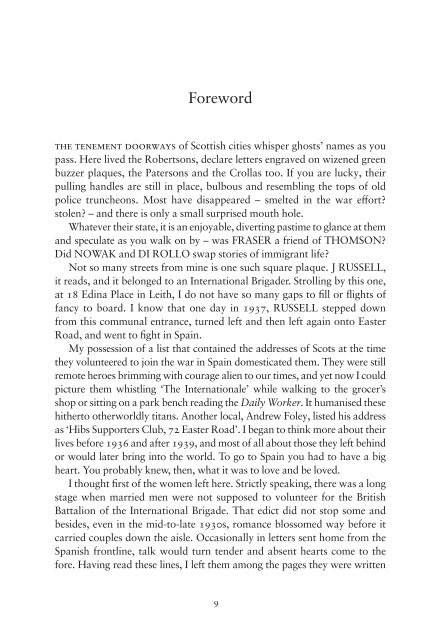Our Fathers Fought Franco by Willy Maley sampler
resonant piece of working class history, this book is a living link to four extraordinary stories. Why did these young men put their lives on the line and go to Spain to fight with the International Brigades? How did they all end up in the same prison cell? And what is their legacy today? James Maley, George Watters, Donald Renton and Archibald Williams were members of Machine Gun Company No. 2 of the XV International Brigade. This is the first book to focus on a small group of men who, from different starting-points, ended up on the same battleground at Jarama, and then in the same prisons after capture by Franco’s forces. Their remarkable story is told both in their own words and in the recollections of their sons and daughters, through a prison notebook, newspaper reports, stills cut from newsreels, interviews, anecdotes and memories, with a foreword by Daniel Gray. Our Fathers Fought Franco is a collective biography that promises to add significantly to the understanding of the motives of those who ‘went because their open eyes could see no other way’.
resonant piece of working class history, this book is a living link to four extraordinary stories. Why did these young men put their lives on the line and go to Spain to fight with the International Brigades? How did they all end up in the same prison cell? And what is their legacy today?
James Maley, George Watters, Donald Renton and Archibald Williams were members of Machine Gun Company No. 2 of the XV International Brigade. This is the first book to focus on a small group of men who, from different starting-points, ended up on the same battleground at Jarama, and then in the same prisons after capture by Franco’s forces.
Their remarkable story is told both in their own words and in the recollections of their sons and daughters, through a prison notebook, newspaper reports, stills cut from newsreels, interviews, anecdotes and memories, with a foreword by Daniel Gray.
Our Fathers Fought Franco is a collective biography that promises to add significantly to the understanding of the motives of those who ‘went because their open eyes could see no other way’.
You also want an ePaper? Increase the reach of your titles
YUMPU automatically turns print PDFs into web optimized ePapers that Google loves.
Foreword<br />
The tenement doorways of Scottish cities whisper ghosts’ names as you<br />
pass. Here lived the Robertsons, declare letters engraved on wizened green<br />
buzzer plaques, the Patersons and the Crollas too. If you are lucky, their<br />
pulling handles are still in place, bulbous and resembling the tops of old<br />
police truncheons. Most have disappeared – smelted in the war effort?<br />
stolen? – and there is only a small surprised mouth hole.<br />
Whatever their state, it is an enjoyable, diverting pastime to glance at them<br />
and speculate as you walk on <strong>by</strong> – was FRASER a friend of THOMSON?<br />
Did NOWAK and DI ROLLO swap stories of immigrant life?<br />
Not so many streets from mine is one such square plaque. J RUSSELL,<br />
it reads, and it belonged to an International Brigader. Strolling <strong>by</strong> this one,<br />
at 18 Edina Place in Leith, I do not have so many gaps to fill or flights of<br />
fancy to board. I know that one day in 1937, RUSSELL stepped down<br />
from this communal entrance, turned left and then left again onto Easter<br />
Road, and went to fight in Spain.<br />
My possession of a list that contained the addresses of Scots at the time<br />
they volunteered to join the war in Spain domesticated them. They were still<br />
remote heroes brimming with courage alien to our times, and yet now I could<br />
picture them whistling ‘The Internationale’ while walking to the grocer’s<br />
shop or sitting on a park bench reading the Daily Worker. It humanised these<br />
hitherto otherworldly titans. Another local, Andrew Foley, listed his address<br />
as ‘Hibs Supporters Club, 72 Easter Road’. I began to think more about their<br />
lives before 1936 and after 1939, and most of all about those they left behind<br />
or would later bring into the world. To go to Spain you had to have a big<br />
heart. You probably knew, then, what it was to love and be loved.<br />
I thought first of the women left here. Strictly speaking, there was a long<br />
stage when married men were not supposed to volunteer for the British<br />
Battalion of the International Brigade. That edict did not stop some and<br />
besides, even in the mid-to-late 1930s, romance blossomed way before it<br />
carried couples down the aisle. Occasionally in letters sent home from the<br />
Spanish frontline, talk would turn tender and absent hearts come to the<br />
fore. Having read these lines, I left them among the pages they were written<br />
9


















